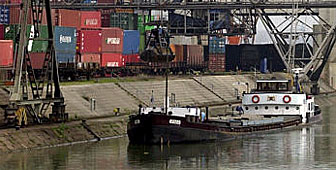Swiss to defend Rhine safety, trade in Rotterdam

Swiss governmental delegates are preparing to defend safety and the environment along the Rhine at a European inter-ministerial conference on inland river navigation in Rotterdam.
The conference on Wednesday and Thursday aims to finds ways to promote transport on Europe’s waterways, and to divert the shipment of goods from the continent’s roads. Market access, legal harmonisation, safety and environmental protection will also be discussed.
For the Swiss, the Rhine has always been important for transporting goods. Switzerland has been involved in international management of the river, since the Vienna convention in 1815.
Swiss economic policy still views the Rhine as a vital element of the country’s foreign trade. Today, the main concerns for the Swiss are safety and the environment, along with access to the international market.
“Switzerland’s own fleet of river boats is relatively modern and safe, but we feel it is necessary to have legislation that ensures the health of the Rhine and other rivers,” said Beat Bürgi of the Federal Office for Water and Geology. “We also want all the countries along the Rhine to continue guaranteeing freedom of navigation.”
Fifteen per cent of the country’s current foreign trade travels along the river to and from Basel, and 30 to 40 per cent of all imported petrol products pass through the city’s harbour.
The authorities hope goods will be transferred in Basel to the railways before they head across the Alps, as part of their combined transport policy.
“There is a connection to the alpine crossings in Basel,” Bürgi told swissinfo. “We hope to make use of the synergies there, because transferring goods from the river to the rails is a perfect fit.”
Basel’s strategic location
Up to nine million tonnes of goods transit annually via Basel, most of it as imports. The Swiss authorities hope to increase this to 12 million in the near future, by upgrading port facilities in the city.
“We think more goods will transit via Basel,” said Bürgi. “The amount of goods transported has increased overall in recent years.”
Work is already under way to increase the height of a number of railway bridges, which will allow larger container ships to dock in Basel. Allowing more vessels to ply the Rhine comes at a cost, however.
“Erosion and pollution of the river and its banks are possible,” said Bürgi. “More traffic also means upgrading the infrastructure, increasing the size of locks and harbours, raising bridges, all which costs money.”
Further use of the river for transport could also restrict casual use of the Rhine by the local population, as well as disturb natural habitats. The authorities consider these minor problems though, compared to the advantages of transferring transport off the road.
“River transport is cheap compared to other forms of transport, and it is also the most environmentally friendly as well,” Bürgi told swissinfo.
swissinfo with agencies

In compliance with the JTI standards
More: SWI swissinfo.ch certified by the Journalism Trust Initiative
You can find an overview of ongoing debates with our journalists here . Please join us!
If you want to start a conversation about a topic raised in this article or want to report factual errors, email us at english@swissinfo.ch.